
These works by Eric Keast, are licensed under a
Creative Commons Attribution-Noncommercial-Share Alike 2.5 Canada License.
Let me explain my Creative Commons license, as it applies to my words, ideas, static images, audio or video, etcetera:
* All non-commercial use allowed, with "Broken Vulture Art" attribution and
"BingoRage.com" citation, for free.
* Don’t be a dink, use the link. {BingoRage}.
* Responsible Commercial use allowed, with "Broken Vulture Art" attribution
and "BingoRage.com" attribution, even if you do not want to pay for it. Just attribute source.
If you can, send me an honest cut or contribution.
* Let me know where I can view use, so I can expand my empire.
:Eric C. Keast
:Broken Vulture Art
---
Greetings Bingo Ragers;
I have been absent, lately. My apologies. A new story, follows, below the fold: Chinaski of Red Lake; Winter 1989. It is accompanied by photo documentation and video of the evolution of the most recent painting (Acrylic on fabric), also entitled: Chinaski of Red Lake; Winter, 1989.

But first, some notes in the blogpost: Current Canadian political weather, the Avatar experience and the source of the Chinaski name reference.
Please click "Read More" for full post, from index page.
UPDATED; January 26, 2010:
1) * Please note... If you are offended by adult language and artistic depiction of human anatomy, please be warned; this blogpost has it. Read on, at peril.
2) Spelling and punctuation corrections.
3) Reduction of detail pic, for loading. Will click through to large detail.
4) Missing links and text added.
4)March 8, 2010. ``Read More`` link added to post
It’s dark out. Not just the dark of a January night, under the cold, dry clear skies, not just the dark of a midwinter blackout at 2 am on a Sunday night (hydro techs are being woken up, grumpy); but, also, the dark of another 3 months untouchable and unrealistic Canadian Conservative Agenda.
Large copyright-portfolio holders (music labels, publishing houses, and even corporate copyright raiders that didn't participate in the original publication) that rail against "theft of their property" are not, for the most part, the creators of that product. They do stand, however poised to graze, for free, upon what would have been public domain; if they hadn't successfully lobbied governments of our neighbours, governments here at home and the world.
Our Canadian government seems poised; to cave in on a mixed bag of copyright extensions and internet controls. Further criminalisation of victimless crimes and suppression of creativity through barriers to our own cultural inheritance. The crime, as presented? It is not the crime of taking a dime from the corporate pocket; the crime is that of refusing to put a dime in the pocket. Refusing the demands to give away ownership of an increasing portion of all publications. Let me refer you to The Tragedy of the commons.
There are crimes in this world that need to be answered for, but victimless crimes need to be removed from our law books. Let us imprison murderers, rapists, assaulters of all stripes and perpetrators of large theft, where real people are victimised (until scarcity is vanquished).
Today, each one of us can have access to an increasingly enriched experience of all human achievements in creativity, science, religion, music, art, writing, and other ideas. The best ideas should be shared and implemented in our shared construction of the future. We are already on a slippery slope, however, allowing special interests to claim and mine the public domain. Increased throttling of the tubes and restrictions on what we can learn is bad policy. Perhaps Canada should take the lead on this, and other issues, for the world.
This is a link to the Public Domain Manifesto; the first paragraph of which, is hereby reprinted:
The public domain, as we understand it, is the wealth of information that is free from the barriers to access or reuse usually associated with copyright protection, either because it is free from any copyright protection or because the right holders have decided to remove these barriers. It is the basis of our self-understanding as expressed by our shared knowledge and culture. It is the raw material from which new knowledge is derived and new cultural works are created. The Public Domain acts as a protective mechanism that ensures that this raw material is available at its cost of reproduction - close to zero - and that all members of society can build upon it. Having a healthy and thriving Public Domain is essential to the social and economic well-being of our societies. The Public Domain plays a capital role in the fields of education, science, cultural heritage and public sector information. A healthy and thriving Public Domain is one of the prerequisites for ensuring that the principles of Article 27 (1) of the Universal Declaration of Human Rights ('Everyone has the right freely to participate in the cultural life of the community, to enjoy the arts and to share in scientific advancement and its benefits.') can be enjoyed by everyone around the world...
Marc Emery is a man who champions the abolishment of victimless criminalisation.
Regardless of your political stance, left or right, I urge that you download and listen to his provocative audio essay:
Stephen Harper and the End of Days (download page).
Direct download
---
I have been bathing in the bioluminescent culture tidal wave that is AVATAR. Much of the response, that I have read and listened to, has not been kind to AVATAR, mostly because of perceived contrast of a brilliant and visionary visual skin with a blatant pastiche of "Memeplex: Indigenous". When I first got back to Northern Ontario and was asked what I thought of the movie, my knee jerk reaction was to call it "Dances with Wolves, in Space."
[*Spoiler Alert*] That is not entirely accurate, however, as the good guys win in this movie. Yay.
I see it as a bold indictment of recent human history and a provocation to the waking sleep of the audience; using the biggest brushstrokes available in our shared human culture.
Here is a link to a fascinating perspective of the movie, as anti-imperialist epic, from Israeli author, Gilad Atzmon .
The Tank riot crew had a take on the film, as they waltz their way through their Joe McCarthy episode. One of them exclaims that James Cameron has us "rooting for the insurgents?!"
---
If you want to get a taste of diverse and engaging perception of global Indigenous culture, then listen to anthropologist Wade Davis' lecture at Seminars About Long Term Thinking. By the time that he gave this lecture, he had already delivered the CBC Massey lectures and distilled ideas from his latest book, Wayfinders; Why Ancient Wisdom Matters in the Modern World.
This audio is from the TV Ontario "Big Ideas" lecture series.
---
In the metaphor of Pandora, all humans are the N’avi. The memeplex of trading cultural and resource destruction for limited gains is represented by the metaphors of the corporation and the mercenaries. The morals are plain: choices and actions have real consequences for real people. All persons on this planet have a personal, honest vision of peace in their heads and it includes the right and expectation to live without fear.
Anyone who would argue that point, is not doing so, honestly.
---
"Henry Chinaski" was an oft returned-to autobiographical character in the literary output of German-American author, Charles Bukowski (1920-1994). Chinaski is a self-described writer, alley-fighter, drunk, lover and King of his tiny patch; terribly confused by the nature of women. He is repulsed and beaten by the need to battle the expectations of society; but occasionally, he wins.
The painting is not direct autobiographical representation, but a stylised diorama of a nostalgia. The composition’s interpretation may parse all of humanity into two parts; which otherwise cut across racial, religious and political lines: Those whom have sat at a cheap table, in a cheap room, in cheap clothes, ducking employment, drinking cheap imported Stout with a bewildering date, making unsellable art and smoking a quality cigarette... and, those whom have not.
Of course, some portion of the whole may resonate with the viewer.
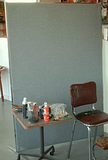
About three years ago, Pam Caine from the Fort Frances Museum had given me some injured display panels, before the renovation. They were covered in a rough, synthetic fabric, but functioned as working canvases. After an initial dash of sketching, notes and paint, the piece was stored for nearly two years.
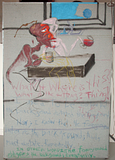
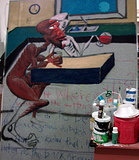
In February 2009, I started resolving the first ideas, then put it aside.
I cut the most promising panel free, and stretched it over a boxframe, shortly before deerhunt (October 2009). I have been focused on this piece for the last few weeks.
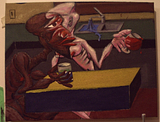
It started as "My Neighbour Was The French-Canadian Henry Chinaski. Red Lake, Ontario; winter, 1991/92." and was trimmed-down to "Chinaski of Red Lake; Winter, 1989." The emergent visual composition reminded me of a weird time in my life; when I tried to rebond with the town that I grew up in and had spent so many years fleeing. I strode away from small-town boredom and unceasing familiarity, then tried sneaking back in.
I do not know what it is like to grow up in a place with only a few dozen or few hundred people, like my relations on small, isolated reserves; but, I know what it is like to grow up in a small town, where a good chunk of the populace have an opinion about you.
---
Chinaski of Red Lake, Ontario. Winter 1989
(With thanks and a deep bow to Charles Bukowski.)
1) home
After I "prematurely" left university, I tried to find work in and reconnect with the place of my childhood. I made that attempt in the depths of some frighteningly-deep cold snaps.
I was at a low point, personally. The field in which my interests and education path followed was on the verge of extinction through apathy, bureaucracy and neglect. I left university as the direction of my personal life changed, in response to those barriers and new interests. Now, I had stepped off a bus in the town of my youth and found myself bracing for the humiliation of asking for public assistance. My resources were nearly nil. I had spoken to a guy on the bus about what to do and was told to "just march in and ask for assistance". Thanks. That was real encouraging. "The lady at the desk will know what to do."
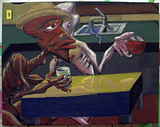
I walked past the municipal office half a dozen times that morning. I found an excuse to skip rocks off the government dock, check out the Northern Rez moosehide and beadwork crafts at the Mennonite-store, get a coffee at The Lakeview, wander through The Bay department store and spray myself with tester cologne. It was probably Hai Karate; my favourite cologne as a young man. Such badass connotations and super-dark green glass.
I briefly debated getting a draft, while standing outside the snakepit. There are many Northern hotels with some variation of the snakepit bar, which I had always found forbidding as a child. They are spiced with the atmosphere of beer, pine needles and random violence; all under a hotel lobby.
Some would argue that “beside-the-lobby’ counts; but, those are not snakepit bars.
---
A buddy of mine once gave me a ride to Elliot Lake via Minneapolis, Northwest Angle #34 Rez, Kenora, Wawa and Sault Ste. Marie. We stopped for a pint at the local snakepit, in Wawa , with my sisters. One of the local Miami Vice peacocks walked up and looked us over, with a goofy grin and chainsaw oil on his shoes. He deduced, out loud, that we had just got out of prison and "that was alright".
That is the kind of assessment to expect in a snakepit.
---
I passed.
The nice lady at the desk opened a file on me. She efficiently and dispassionately typed my application in triplicate, with carbons; a job that she could probably do, blindfolded. I was given a xerox copy of a form to be filled out by ten prospective employers, swearing that I had honestly applied for employment with them and had been honestly turned down. There was no work that I wished to do, or was qualified to do, so the form was relatively easy to get filled out. I spent awkward moments surprising an old acquaintance from high school, but he generously put me up for the night. I was on the dole the next day and had been given some phone numbers to call regarding "affordable" living arrangements.
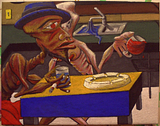
2) flop and tea
I moved into a small, family-run flophouse that afternoon and spent an interesting season, painting, writing and enduring eventual employment during those long, destitute and creative nights. I remember buying cigarette tobacco by the tin, filtered paper "tubes" and investing in a big-ticket item; my own cigarette machine. It was the cheapest way to smoke, rationing them out over the stretch of pay periods, or the abysmal one month pogey.
I would stay up late most of the time, when I didn’t have to get up early to work, or late to look for work. I would stay up drinking tea, or beer when I could afford it, sketching, reading and exploring paint. Most establishments looking to hire, like to see people who arrive early. I loved work that started late and finished early. I love to go to bed, when others are waking.
Eventually, I found work for the rest of the season at a work-release program for Native provincial inmates. It was way the hell down Forestry Road, however and and was a long, long walk. The walks were especially long, when you could hear trees breaking from the cold, off in the distance. It was easy work, though; stay up all night, keep a log of events and pray that nobody would take off, or get busted with alcohol during your shift. That could be real hassle for everyone's immediate future when they're trying to get straight and could not be ignored.
It meant real paperwork.
After a cheque came my way, I would pay off the nervous landlords. They were good people whose investment was tied up in a rotten boom and bust racket. With the blast of mineral exploration in the last ten years, that place may be hopping with drillers and skidder-drivers whose rent is paid in advance by the company. Back then, it groaned and swayed with the walking dead, slightly homeless whitefolk and the odd Indian artist. Grim prospects, indeed.
When the rent was paid, tobacco tin purchased and a few groceries laid in, then I could afford beer and the odd treat of whiskey. Rice, tea, flour, baking soda, sugar, butter, salt and canned, condensed milk made up the bulk of my larder. Real sausage was a luxury, but the highest quality stuff was made, right down the street. I attended bingo at the Ukranian church as a child and ate pedigreed perogies at the Polish Hall. I knew good Kielbasa... Or "koo-bahsaw", as it was known on the street.
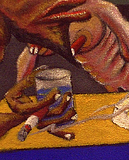
3) shelter and mix
I was hardly noticed in town. The reconnection with friends and hometown wasn’t as grand as I’d imagined, but it was educational. Perhaps I was better-off than destitute in a major metropolis, but was cut off from all but a tiny, local artistic community. There was no money to be made with art, but I didn’t stop learning and exploring. I didn’t stop living. In my hometown, some people had to live even cheaper and harder. You could literally walk off the road a ways and build a tiny place to live, without much in the way of rigorous inspection; and it would be tolerated. The talent of the builder was not always up to the conditions, however. I was in Ted’s Diner, when I heard that "an old Indian woman" had frozen to death in a tarpaper and plywood shack on the town limits. There had been a woodstove, apparently, but no one to get wood when she became incapable of doing so. Nobody to ask, anyway. Not so different, perhaps, when compared to the discovery of Cat Ladies and hoarders, years after their deaths, in the middle of bustling urban neighbourhoods. The memory shames me, even now. Stuff like that isn’t supposed to happen in small towns.
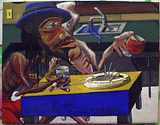
I was sitting up late, one night; drinking tea, making bannock and reading a book in the kitchen. The lighting was better there, than in my room and was the only place in the building that didn’t make me feel claustrophobic. Even the coin laundromat in the basement felt enclosed; bay-window storefront, not withstanding.
I walked into the stairwell and lit a smoke. Then, I heard a shout. The Laundromat had been closed and locked for hours, but I thought I heard a shout down there. I crossed, barefoot, to the chilly stairwell’s window and looked down. There were a couple of Indian guys down there, in the entrance light of the laundry and they were absolutely going to freeze to death; no question. It was at least thirty below celsius, snowing and windy. They were dressed in light, long-sleeved, button-up cowboy shirts, denim jeans and cheap sneakers. No gloves, no jackets.
They were fucked and I was fucked if i didn’t let them in.
I got my shoes on and went downstairs. I startled them, when I reached the bottom and threw open the door, but they hauled ass when I told them to get the fuck inside.
I gave them hot, strong, sweet tea and a little bannock and got their story, then. These two guys were from some isolated Northern Rez and had caught a ride into town, at significant expense, on a bush plane. They had partied continuously, until "all their money" had been used up. They’d lost their winter gear and had been looking to get credit from some bootlegger that they couldn’t find. I thought that I was on an adventure; these guys were provincially-ranked fuckups. Now, they were just killing time and trying to find a way home, or, "some chicks to live with". They were really pushing it.
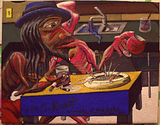
After finishing their bannock and taking a polite sip of tea, they asked if I "would mind, if they mixed...". Hoping to get a little shot of something to mix with my last diet cola, I said "Sure, why not." Both of my guests grinned, then produced a beat-up cola can and a pump-bottle of hair spray; Alberto VO5. My mind lurched at the sight.
They proceeded to mix the hair spray with an equal amount of tap water in the cola can, then took turns chugging it down. I politely refused, but stared in open fascination as we talked about nothing and hair spray.
They got fucked-up, hard and fast; one guy worse than the other. He began to growl his words through clenched teeth and shake his fist at the cupboards; perhaps at the sky, beyond. His anger rose, but his ability to express it had been taken from him, including the ability to reach out and punch me. I could see it in his eyes and so could his buddy. Buddy thanked me for tea and bannock, then dragged Angry out the door and down the stairs. Bullet dodged.
Half an hour later, I found them in the laundromat. Maybe someone let them in, but they could have jimmied the door. Angry was on the floor, convulsing. I swore loudly when I saw him, but swore louder as Buddy took off with the hair spray and left him. The ambulancey guys showed up in about twenty minutes and trundled him off. Maybe he got home by medical transport, eventually.
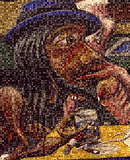
4) chinaski of red lake
One of my neighbours was a pensioned, incomprehensible, old Frenchman in a toque; one of those knit caps with a dirty orange ball of frayed yarn on top. He probably slept in it. Total hoser; always smoking, drinking beer, smiling and quietly laughing. I made him alot of cigarettes with my tobacco stash and cigarette machine.
I come in late, one night; totally beat, broke and tired. Here’s Frenchy at the kitchen table, smoking and drinking with an Indian woman who is significantly younger than he is. She’s wearing that strange Northern Rez outfit of blue jeans under a long skirt and clearly wants his undivided attention. She can’t stand me. I’m another excuse for Frenchy to have another smoke, tell me a joke and sip his drink.
I start making some bannock and offer them some. She’s hungry and quits nagging him for a bit. They eat their bannock with margarine and jam from his stash. Not talking, but smiling alot. When they finish, she starts punching his shoulder and trying to pull him towards his room, which was the same size closet as mine. He shrugged, got up and went, putting up a token resistance in bastardised Franglish and maybe a little Ojibberish. They disappear, leaving me to my last beer. Soon I hear her giggling. Soon, though, she gave an angry little shout.
Frenchy came out of his room doing a clown’s tiptoe routine. The grumbling from his room sounded anything but amused. He handed me a couple cigarettes and a mickey of whiskey, a third full. He gestured then, making the universal "Shhhh" signal with his index finger over his lips, then tiptoed back into the room, hamming it up for me. Angry words flare, then are still, under the whispering. The ritual invocation of the soft, universal noises of placation. I’ve heard the same cajoling, murmured promises and aplogies in artsy Italian movies, classy cafes, dive bars, the theatre of queens and knights and the words of poets. I put on the radio and tried not to listen to the giggling.
I had spent the whole winter, imagining myself as some kinda tough guy artist, but I’d been out-Chinaskied in my own kitchen. I lit one of my half-smoked cigarette butts, saving the good stuff, for later. I was damned lonely.
6) hasta
By April, I was ready to leave. The snow was gone, but the mud was everywhere. I remembered seeing pictures , as a teenage museum intern, of gold rush era Red Lake... showing streets resembling volcanic mud flows. The streets of downtown had been raised almost eight feet in places, to fit the pipes and pavement to hold back the sucking mud. There were still a number of houses and businesses on the lakeward side of the street, that you had to walk down several steps to enter. They had formerly been at street level.
I had a job starting in a couple of months that would pay me to spend my whole summer on the rivers and lakes; searching for, recording and reporting pictographs. Ancient paintings, scattered across the cliffs of the Canadian Shield and across time. They bridge time as shared canvases for the flow of populations across the land, for thousands of years.
The sun rose earlier every day. I left to share another summer of adventure and discovery, with people I loved.
- END
Please click the thumbnail, for view of current incarnation of the composition; {larger detail click pic at link, for zoom.} January 26, 2010.
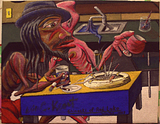
Here is a video, showing the evolution of the composition and canvas.
Thanks for checking out the BingoRage. If you enjoyed this post, please forward, tweet, Digg, podcast, comment below, etc.
Miigwetch
:Eric
--------------------------------------------------------------------------------------------------
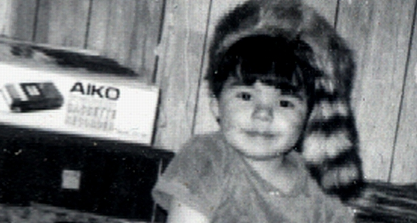

3 comments:
Love this piece Eric, i was right with you in the winter of 89couldnt stop reading, and the painting - wow amazing, sara
Thats a real nice canvas. Wouldn't fuck with it too much more.
As long as they are on the wall, they are never done.
:E
Post a Comment